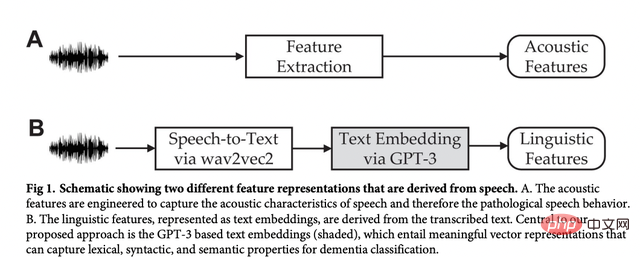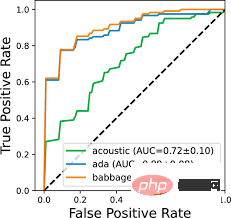ChatGPT can identify Alzheimer's disease with 80% accuracy
ChatGPT has recently taken the Internet by storm with its powerful functions. It is easy to draft legal contracts and write novels, and it can even help you program.
But these seem to be humans testing AI. Can ChatGPT in turn obtain some useful information from conversations with humans?
But it turns out that ChatGPT’s technology can actually do things like help detect early symptoms of Alzheimer’s disease.
Alzheimer's disease is commonly known as "dementia". One of the most common and obvious symptoms of this disease is language problems, such as grammatical errors, pauses, repetition or forgetting the meaning of words. A study by Drexel University of Biomedical Engineering in Philadelphia found that ChatGPT can find out whether there are such symptoms through dialogue with humans, thereby promptly prompting the risk of illness.

Paper address:
https://journals.plos.org/digitalhealth/article? id=10.1371/journal.pdig.0000168
Use ChatGPT to detect early Alzheimer’s disease with an accuracy of 80%
Early detection Alzheimer's disease treatment options could significantly improve, giving patients time to make lifestyle changes that slow the progression of the disease. Diagnosing the disease often requires brain imaging or lengthy cognitive assessments, but these can be expensive and time-consuming, making them unsuitable for widespread screening.
Automatic speech analysis as AI technology becomes popular is a promising way to detect Alzheimer's disease early, said Liang, a professor of biomedical engineering at Drexel University in Philadelphia. One of the most common and obvious symptoms of the disease is language problems, such as grammatical errors, pauses, repetitions or forgetting word meanings, which has led to growing interest in using machine learning to spot early signs of the disease in the way people speak.
"Our hope is that we can use machine learning to pick up these signals so that we can make early diagnoses."
Usually This technique relies on purpose-built models, but Liang and his colleagues wanted to see if they could repurpose the technology behind ChatGPT—OpenAI’s large language model GPT-3—to detect Alzheimer’s disease signs.
They found that ChatGPT could indeed differentiate between voice recordings of Alzheimer's disease patients and healthy volunteers, with an accuracy of 80%.
"Large language models like GPT-3 are very powerful, and they are able to spot these subtle differences," Liang said. "If a study subject has some kind of problem (involving) Alzheimer's that's already reflected in the language, we hope to be able to use machine learning to pick up those signals so that we can make an early diagnosis."
The researchers tested 237 recordings taken from healthy volunteers and Alzheimer's patients, which were converted into text using a pre-trained speech recognition model. . To get GPT-3's help, the researchers took advantage of one of its lesser-known abilities. Its API makes it possible to feed a piece of text into a model and have the model output an “embedding”—a numerical representation of a piece of text that encodes its meaning and can be used to evaluate its similarity to other texts.

Although most machine learning models deal with "embedding", a new feature of GPT-3 is that it is sufficient Powerful, can generate "embedding" for entire paragraphs. And due to the sheer size of the model and the vast amounts of data used to train it, it is capable of producing very rich text representations.
The researchers used this ability to create "embeddings" for all transcripts from Alzheimer's patients and healthy individuals. They then selected these "embeddings," combined with labels to indicate which group they came from, and used them to train a machine learning classifier to distinguish between the two groups.
Fine-tuning actually reduces the accuracy, and there is still work to be done in the future
According to a report in the magazine "PLOS · Digital Health" A paper reports that the best classifier achieved 80.3% accuracy when tested on unseen transcripts.

This is significantly better than the 74.6% result obtained by the researchers using a more traditional approach to speech data, which relies on acoustic features that must be carefully identified by experts. They also compared their technique to several cutting-edge machine learning methods that use large language models and include the additional step of fine-tuning the model using some text obtained from the training data.
Interestingly, GPT-3's performance actually dropped when the researchers tried fine-tuning it. This may seem counterintuitive, but Liang points out that this may be due to a size mismatch between the large amounts of data used to train GPT-3 and the small amount of domain-specific training data available for fine-tuning.
Frank Rudzicz, associate professor of computer science at the University of Toronto, said that while the research team did achieve state-of-the-art results, relying on privately owned models for such research does pose some problems.
He said: "These closed APIs are limited in part because we cannot inspect or deeply modify the internal structure of these models, nor can we conduct a more complete series of experiments to Help illuminate potential sources of error that we need to avoid or correct."
Liang is also open about the limitations of this approach. The model is nowhere near accurate enough to properly diagnose Alzheimer's, he said, and any real-world deployment of the technology would serve as an initial screening step designed to direct people to experts for a full medical evaluation. As with many AI-based methods, it can be difficult to know exactly what a model detects when it detects Alzheimer's disease, which can be a problem for medical staff. "Doctors will naturally ask you why you got these results," Liang said. "They want to know what features are really important." Still, Liang thinks the approach has great promise, and he and his colleagues are planning to develop an application , which can be used at home or in a doctor's office to simplify screening for disease.
Related reports:
https://spectrum.ieee.org/gpt-3-ai-chat-alzheimers
https:// journals.plos.org/digitalhealth/article?id=10.1371/journal.pdig.0000168
The above is the detailed content of ChatGPT can identify Alzheimer's disease with 80% accuracy. For more information, please follow other related articles on the PHP Chinese website!

Hot AI Tools

Undresser.AI Undress
AI-powered app for creating realistic nude photos

AI Clothes Remover
Online AI tool for removing clothes from photos.

Undress AI Tool
Undress images for free

Clothoff.io
AI clothes remover

AI Hentai Generator
Generate AI Hentai for free.

Hot Article

Hot Tools

Notepad++7.3.1
Easy-to-use and free code editor

SublimeText3 Chinese version
Chinese version, very easy to use

Zend Studio 13.0.1
Powerful PHP integrated development environment

Dreamweaver CS6
Visual web development tools

SublimeText3 Mac version
God-level code editing software (SublimeText3)

Hot Topics
 1377
1377
 52
52
 ChatGPT now allows free users to generate images by using DALL-E 3 with a daily limit
Aug 09, 2024 pm 09:37 PM
ChatGPT now allows free users to generate images by using DALL-E 3 with a daily limit
Aug 09, 2024 pm 09:37 PM
DALL-E 3 was officially introduced in September of 2023 as a vastly improved model than its predecessor. It is considered one of the best AI image generators to date, capable of creating images with intricate detail. However, at launch, it was exclus
 The perfect combination of ChatGPT and Python: creating an intelligent customer service chatbot
Oct 27, 2023 pm 06:00 PM
The perfect combination of ChatGPT and Python: creating an intelligent customer service chatbot
Oct 27, 2023 pm 06:00 PM
The perfect combination of ChatGPT and Python: Creating an Intelligent Customer Service Chatbot Introduction: In today’s information age, intelligent customer service systems have become an important communication tool between enterprises and customers. In order to provide a better customer service experience, many companies have begun to turn to chatbots to complete tasks such as customer consultation and question answering. In this article, we will introduce how to use OpenAI’s powerful model ChatGPT and Python language to create an intelligent customer service chatbot to improve
 How to install chatgpt on mobile phone
Mar 05, 2024 pm 02:31 PM
How to install chatgpt on mobile phone
Mar 05, 2024 pm 02:31 PM
Installation steps: 1. Download the ChatGTP software from the ChatGTP official website or mobile store; 2. After opening it, in the settings interface, select the language as Chinese; 3. In the game interface, select human-machine game and set the Chinese spectrum; 4 . After starting, enter commands in the chat window to interact with the software.
 How to develop an intelligent chatbot using ChatGPT and Java
Oct 28, 2023 am 08:54 AM
How to develop an intelligent chatbot using ChatGPT and Java
Oct 28, 2023 am 08:54 AM
In this article, we will introduce how to develop intelligent chatbots using ChatGPT and Java, and provide some specific code examples. ChatGPT is the latest version of the Generative Pre-training Transformer developed by OpenAI, a neural network-based artificial intelligence technology that can understand natural language and generate human-like text. Using ChatGPT we can easily create adaptive chats
 Can chatgpt be used in China?
Mar 05, 2024 pm 03:05 PM
Can chatgpt be used in China?
Mar 05, 2024 pm 03:05 PM
chatgpt can be used in China, but cannot be registered, nor in Hong Kong and Macao. If users want to register, they can use a foreign mobile phone number to register. Note that during the registration process, the network environment must be switched to a foreign IP.
 How to use ChatGPT and Python to implement user intent recognition function
Oct 27, 2023 am 09:04 AM
How to use ChatGPT and Python to implement user intent recognition function
Oct 27, 2023 am 09:04 AM
How to use ChatGPT and Python to implement user intent recognition function Introduction: In today's digital era, artificial intelligence technology has gradually become an indispensable part in various fields. Among them, the development of natural language processing (Natural Language Processing, NLP) technology enables machines to understand and process human language. ChatGPT (Chat-GeneratingPretrainedTransformer) is a kind of
 How to build an intelligent customer service robot using ChatGPT PHP
Oct 28, 2023 am 09:34 AM
How to build an intelligent customer service robot using ChatGPT PHP
Oct 28, 2023 am 09:34 AM
How to use ChatGPTPHP to build an intelligent customer service robot Introduction: With the development of artificial intelligence technology, robots are increasingly used in the field of customer service. Using ChatGPTPHP to build an intelligent customer service robot can help companies provide more efficient and personalized customer services. This article will introduce how to use ChatGPTPHP to build an intelligent customer service robot and provide specific code examples. 1. Install ChatGPTPHP and use ChatGPTPHP to build an intelligent customer service robot.
 The perfect combination of ChatGPT and Python: building a real-time chatbot
Oct 28, 2023 am 08:37 AM
The perfect combination of ChatGPT and Python: building a real-time chatbot
Oct 28, 2023 am 08:37 AM
The perfect combination of ChatGPT and Python: Building a real-time chatbot Introduction: With the rapid development of artificial intelligence technology, chatbots play an increasingly important role in various fields. Chatbots can help users provide immediate and personalized assistance while also providing businesses with efficient customer service. This article will introduce how to use OpenAI's ChatGPT model and Python language to create a real-time chat robot, and provide specific code examples. 1. ChatGPT




